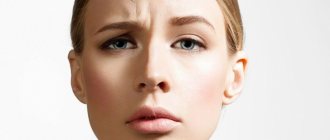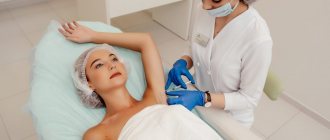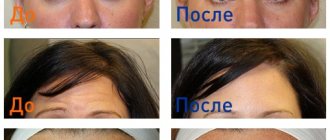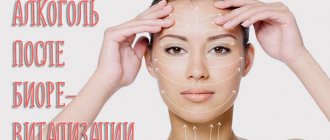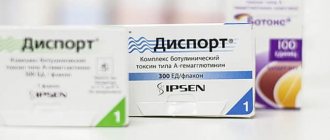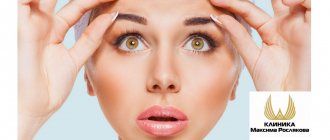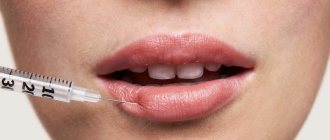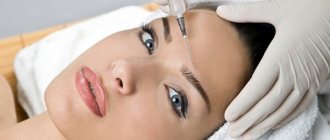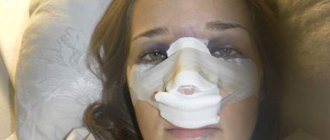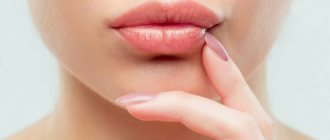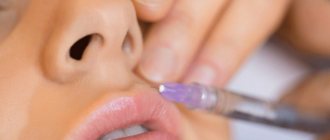The principle of action of the drug
Dysport is a drug based on botulinum neurotoxin type A (BTA), a protein that is a muscle relaxant.
The action of a muscle relaxant is to block the transmission of a nerve impulse that contracts muscles without interfering with their blood circulation and nutrition, and when the drug is administered subcutaneously, the muscle fibers relax. Accordingly, wrinkles are smoothed out.
As part of Dysport, botulinum toxin is presented in microdoses; it will not cause harm to the body (does not cause poisoning). Ultimately, it will be completely broken down by the body and excreted by the kidneys.
Dysport and alcohol
Dysport contains botulinum neurotoxin, which is dangerous to humans. It is formed, for example, in spoiled canned food in the absence of oxygen, and is a deadly poison if it enters the body with food.
[bsa_pro_ad_space id=3] [bsa_pro_ad_space id=7]
Absorbed into the blood from the digestive tract, botulinum neurotoxin or botulism toxin causes paralysis of the respiratory muscles and cardiac arrest. Without treatment, botulinum neurotoxin poisoning causes death in 50% of cases.
In cosmetology, microdoses of this neurotoxin are used; the toxin does not cause any harm to the body in such small concentrations. Having completed its task, the toxin is safely broken down by the body and after 2 days is completely eliminated by the kidneys.
Contraindications for use
Who is not suitable for using Dysport:
- children under 2 years of age (the effect of the drug has not been studied on patients of this age);
- pregnant women, as well as during lactation (a tiny dose of the toxin passes into breast milk, and it is unknown how the child’s body will react to the foreign protein);
- people with individual intolerance to the drug (allergy sufferers should use BTA with caution);
- for hemophilia. Hemophilia is a blood clotting disorder; it is the injection process that is dangerous;
- for neuromuscular diseases (the effect of the drug has not been studied in patients with similar diseases);
- people with alcohol addiction. The instructions for the drug do not recommend drinking alcohol when injecting Dysport.
Description of Dysport
Dysport is an analogue of Botox . The drugs include botulinum toxin, which is a dangerous poison. The products are used not only in cosmetology, but also in medicine to eliminate cerebral palsy and torticollis. In cosmetology, a special botulinum toxin is used in microdoses, which after 2 days completely dissolves in the body and is excreted through the kidneys.
Dysport is injected intramuscularly into areas determined by a specialist. The manipulation is carried out using thin insulin needles. The procedure takes no more than 30 minutes and is performed under local anesthesia. Dysport acts like a muscle relaxant. After entering the body, it does not allow nerve impulses to pass through, the muscles stop contracting, and the blood supply begins to be disrupted.
Injections are performed to eliminate facial wrinkles near the eyes, forehead, and eyebrows. But there are many side reactions . According to women's reviews, after the injection of the product, the upper eyelid sagging. The product begins to affect the body after 2-3 days and lasts for about 6 months. To completely eliminate wrinkles, 2-3 sessions will be required.
The Dysport procedure is permitted only in medical institutions. If the dose of the treating drug is calculated incorrectly, there is a high probability of death for the patient.
To avoid possible troubles after the procedure, you need to figure out exactly whether it is possible to drink alcohol before the procedure, what is the compatibility of ethanol and botulinum toxin.
Effect of the drug on the body
Dysport injections are used to smooth the skin and eliminate wrinkles. They contain botulism toxin, which is very dangerous for the body. It is present in spoiled canned food and is one of the deadly poisons that enter the body with food. Penetrating into the human blood, botulinum neurotoxin causes severe paralysis of the respiratory tract and can lead to cardiac arrest. Without timely treatment, such poisoning leads to death in 50% of cases.
Microdoses of this substance are used for cosmetic procedures. In small concentrations, Dysport is considered completely safe for the human body. Having completed its main task, it is actively broken down in the body and excreted by the kidneys after a few days.
Injections will be justified if the patient:
- there are pronounced facial wrinkles in the forehead and near the eyes;
- in preparation for correction of the shape of lips and eyebrows;
- severe sweating of the palms, armpits and feet.
The injection does not take effect immediately, but approximately 3 days after visiting a cosmetologist. To prolong the effect, doctors recommend repeating the procedure every 6 months.
How does ethanol affect the drug?
Botulinum toxin, which is the main active ingredient of Dysport, quickly penetrates into the tissues surrounding the injection site. Accordingly, there are restrictions necessary for the concentration of the drug in the injection zone and preventing its penetration into adjacent tissues.
Visiting bathhouses and saunas, any warming procedures, active physical exercise, and physical influence on injection sites are prohibited (massage cannot be performed). All of these are warming and vasodilating effects.
Ethyl alcohol (ethanol) creates a thermal and vasodilating effect similar to these prohibitions, and specifically in the upper part of the body.
Ban on the use of Dysport
Before administering the injection, the attending physician must carefully examine the client for contraindications.
The drug should not be administered if:
- children's age (the procedure is prohibited for children under 12 years old);
- the patient is undergoing treatment with antibiotics, aclofen, antiplatelet agents, and anticoagulants;
- time of bearing a child and breastfeeding;
- the presence of infectious lesions in the body.
Absolute contraindications for taking the drug include:
- hypersensitivity to the components of the drug. The presence of allergic reactions to medications of protein origin.
- blood pathologies that are associated with coagulation, for example, hemophilia or leukemia;
- chronic diseases of the respiratory system;
- clinical or subclinical reactions of neuromuscular diseases.
Is it possible to drink alcohol before injections?
The presence of alcohol in the human body is undesirable at the time of drug administration. This is due to the incompatibility of its effects with the effect provided by botulinum toxin.
But, there is no exact time limit after which you cannot drink alcohol before injections. And, it is impossible to make medical calculations that will accurately indicate the complete removal of ethanol from the body.
Factors influencing the elimination of alcohol can be identified:
1. Quantity
The more you drink, the slower it is excreted, this is obvious. With frequent consumption of alcohol, the liver cannot cope with such a load, does not have time to process it, and sends it back into the bloodstream. The body is cleansed in a similar way with rare but heavy intake of alcohol.
2. Body weight
The degree of intoxication in narcology is usually calculated based on the pure alcohol content in the blood; this indicator is directly proportional to body weight. That is, the greater the weight, the faster alcohol is eliminated.
3. Liver condition
A healthy liver removes alcohol from the body better and faster. The damaged one copes slowly and partially.
4. Strength of alcoholic drink
This refers to the amount of alcohol in the drink; the more of it, the stronger the drink, and the longer it stays in the blood.
Taking into account all these features, it is only possible to calculate the period of abstinence from alcohol before the introduction of Dysport.
The opinions of doctors and cosmetologists on this issue vary greatly. Some people say 2 days, others say two weeks.
The period and period of restriction of alcohol consumption before introducing Dysport into the body can either be calculated independently (and very conditionally), or trusted by a doctor (cosmetologist).
Possible consequences
Although alcohol and Dysport do not interact directly with each other, there should be no alcohol in the blood when the drug is administered.
Ethyl alcohol in the body:
- Disturbs the distribution of botulinum toxin in tissues;
- Affects the rate of absorption of the drug;
- Retains fluid in the body;
- Disables control over the situation, leads to carelessness and violation of instructions.
Why not? When muscle relaxants are administered in the presence of alcohol, the distribution of botulinum toxin in the muscles is disrupted. This disorder has a particularly strong effect on small, mobile facial muscles.
Drinking alcohol changes the rate of absorption of the neurotoxin, making the effect unpredictable. Increased blood flow leads to migration of the toxin into surrounding tissues, reducing the concentration of the drug at the point of administration of Dysport.
In addition, after the introduction of Dysport, there are prohibitions that must be strictly followed. For example, you should not touch the injection sites, massage them, and you should not tilt your head for 3-4 hours.
You cannot inject botulinum toxin and actively move, dance, or sweat. A person does all this if he drinks; drinking alcohol makes him forget about all these prohibitions.
Alcohol retains fluid in the body, and this is especially undesirable in the first day. The stimulating effect of ethyl alcohol also increases the activity of peripheral nerve receptors that regulate muscle contractions.
And this is exactly the opposite of the inhibitory, paralyzing effect of Dysport on the muscles that it has when administered. Thus, alcohol partially neutralizes the effect of botulinum toxin.
Drinking alcohol while taking Dysport causes side effects such as:
- swelling of the upper eyelids;
- drooping, raising eyebrows;
- pain at the injection site;
- blurred vision;
- contributes to allergies, increasing the load on the liver.
An unpleasant surprise when Dysport interacts with alcohol is the complete absence of the expected cosmetic effect or its short-lived effect.
The tightening, rejuvenating effect of the drug appears in some cases already 2 days after the injection. In other cases, you have to wait a week for visible results.
How soon can you drink alcohol after the procedure?
The neurotoxin penetrates the tissue gradually. As a rule, the instructions for the drug indicate the time when the effect becomes noticeable - this is approximately 2 days, and the maximum is reached on the 14th day.
According to these data, it can be assumed that alcohol consumption after the procedure should be limited for about two weeks.
The exact timing (when you can drink alcohol after injections) has not been confirmed by medical research; accordingly, doctors and cosmetologists independently calculate the time of restrictions.
There is no consensus here either. There are recommendations on terms: minimum - 2 days, maximum - 14 days.
conclusions
There is some controversy regarding the timing of the ban on alcohol during Dysport treatment. Some doctors consider it possible to limit the prescribed 2 weeks before treatment and 10-14 days after the injection to 3 days before the injection and a week after the injection.
There is also an opinion that drinking alcohol after a Dysport injection is not harmful, and ethyl alcohol is able to bind botulinum toxin only in vitro, outside the body. And indeed, there are rave reviews from women online that they celebrated their “new face” with a glass of wine or a glass of beer.
But is it worth risking your health, beauty, material costs, and finally, for the sake of alcohol? Wouldn't it be safer to celebrate after two weeks, according to the instructions?
Memo to the patient after botulinum toxin injections (Botox/Dysport)
- Botox/Dysport
- Correction of hyperhidrosis
The procedure can be performed either with or without anesthesia.
Depends on the correction area and the volume of the procedure. After the objectives of the procedure are determined and the botulinum toxin drug that is most optimal for the patient is selected, the doctor begins to carry out preparatory procedures prior to drug injections.
If we are talking about the correction of hyperhidrosis, then the patient will necessarily undergo the “ Minora ” test in order to identify increased areas of sweating, for the effective use and distribution of the drug.
If the procedure is aimed at correcting facial wrinkles , then the doctor applies markings in the correction area, noting the more pronounced areas of facial muscle activity that cause creases and facial wrinkles.
After applying the markings, botulinum toxin is injected pointwise. The procedure for the patient may be uncomfortable at times, but quite tolerable.
Basic recommendations after the procedure:
- Be in an upright position for 3-4 hours after the procedure
- Do not massage the injection area
- Cool the injection site (apply ice) for 15-20 minutes
- Make muscle movements in the area where the drug is administered for 30 minutes after the procedure
- Avoid hot compresses on the injection area, baths and saunas for one to two weeks after the procedure.
- Limit alcohol consumption in the first two weeks after the procedure
The doctor gives more detailed written recommendations after the procedure. The effectiveness of the procedure depends on the quality of following the recommendations.
the results after the procedure 5-7 days after the injections.
Information on the pricing policy for procedures using botulinum toxins can be found in the “Injection cosmetology and care” section.
Reception is carried out by qualified doctors - botulinum therapists. Consultations at the clinic are free and encouraged.
Doctors at Damas Clinic
Shirin Dzhumaevna Khaidmuradova
cosmetologist, dermatologist, botulinum therapist, laser therapist
Albina Mukhametovna Khokhlova
dermatologist, cosmetologist, trichologist, laser therapist
Lalita Magomedovna Korigova
cosmetologist, dermatologist, botulinum therapist, laser therapist
Rosa Gidaltievna Gerliani
dermatologist, cosmetologist, botulinum therapist, laser therapist
